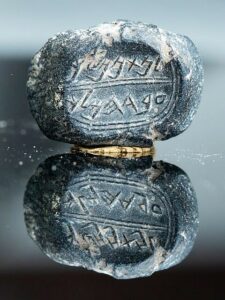 Here we go, with another of my nautical words. I am no sailor or even that much of a lover of “going to the beach,” though if it’s a rugged coastline in Nova Scotia, Ireland, or northwest Spain, count me in. The deep blue or green of their oceans look unfathomable, as compared to the sandy brown waters I knew as a kid.
Here we go, with another of my nautical words. I am no sailor or even that much of a lover of “going to the beach,” though if it’s a rugged coastline in Nova Scotia, Ireland, or northwest Spain, count me in. The deep blue or green of their oceans look unfathomable, as compared to the sandy brown waters I knew as a kid.
Our word has a long history and still has current use, though I’ve yet to have a student employ it. They should. Consider this June 2023 usage from Merriam-Webster’s Dictionary online:
Tesla was truly ahead of his time, and quite a few of his ideas—notions that were unfathomable in that day and age—are still being pursued to this day.
Nikola Tesla was a genius, but if his ideas were truly unfathomable, would we have continued to pursue them? What is unfathomable cannot be measured. The origin is the fathom, a nautical unit of measurement meaning the span of two arms, or roughly six feet. Now it has been standardized to six feet. The origin? The Old English word fæðm. The Online Etymology Dictionary also noted the verb form, fathom, meaning to try to understand.
What at sea was unfathomable? Water beyond the 100-fathom hand-sounding line carried by ships. In deeper waters, a 300-fathom line might be dropped. From that same page I learned that burial at sea required six fathoms of water and gives us the term “to deep six” something. Full fathom five? Thy father was not properly buried at sea, Ferdinand.
I hope to introduce this lovely word to students who too often seem to employ the same 500 words again and again. Fathom and unfathomable merit closer fathoming, as well as usage in our formal writing. The Etymology Dictionary has a neat feature on its page that charts trends in usage. Fathom the noun has suffered a slow decline, whereas the verb has enjoyed a steady rise in usage.
Perhaps that rebound has happened because we live in apparently unfathomable times. We have many leagues to travel before we fathom some of our current problems. By the way, a league is another unit of nautical measurement, three nautical miles. That means 3.452 miles or 5.556 kilometers. Jules Verne’s novel would then put Nemo and crew a quarter of the way to the Moon. Even 20,000 fathoms under the sea would put them under the Earth’s crust, but the title certainly sounds evocative.
Send in useful words or metaphors, by e-mailing me (jessid -at- richmond -dot- edu) or leaving a comment below.
See all of our Metaphors of the Month here and Words of the Week here.
Image source: Wikipedia
